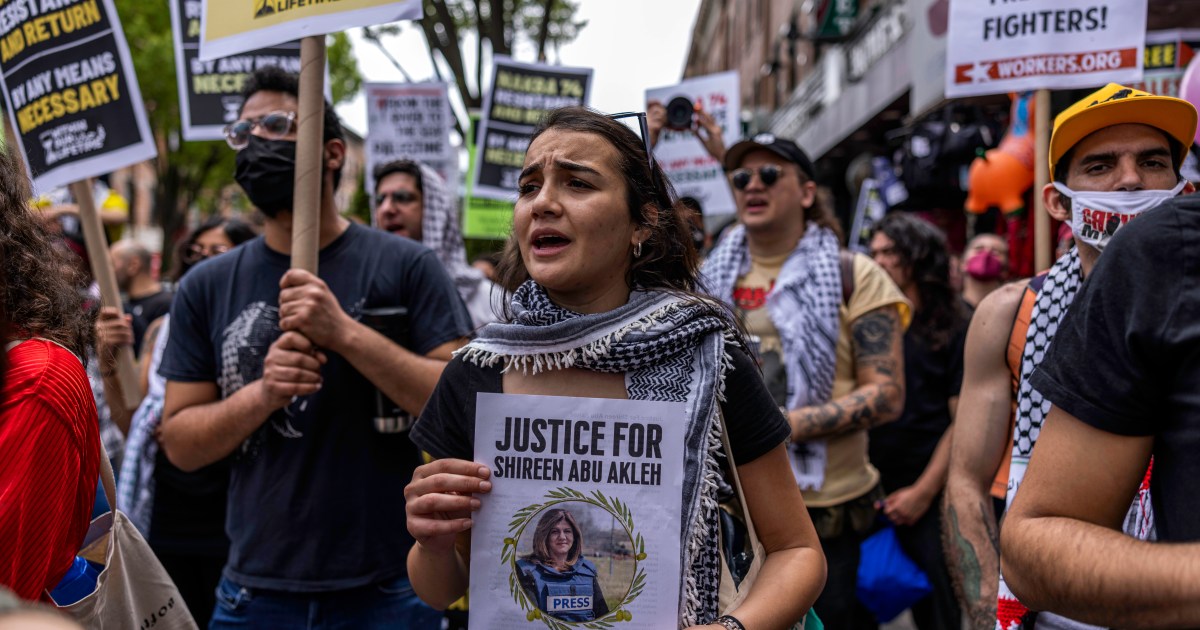As Iran nuclear talks enter final stretch, opposition grows in US | Nuclear Energy News
Washington, DC – United States Senator Bob Menendez started an hour-long presentation on the Senate floor last week with a poster featuring a green, white and red bomb – the colours of the Iranian flag.
Over the next 60 minutes, the chair of the Senate Foreign Relations Committee argued tirelessly against reviving the Iran nuclear deal, warning that the curbs the pact would impose on what he called Tehran’s “dangerously and rapidly escalating nuclear programme” are not enough.
“At this point, we seriously have to ask: What exactly are we trying to salvage?” Menendez, a key Democrat, said on February 1.
As Iran nuclear deal negotiations enter the “final stretch”, Menendez is not alone in voicing opposition to reviving the landmark agreement, with Republicans and hawkish Democrats in Washington, DC warning President Joe Biden against restoring the pact.
That more vocal US rebuke of the agreement, formally known as the Joint Comprehensive Plan of Action (JCPOA), is a sign that a deal is imminent, analysts say – and that Biden is pushing ahead to secure it despite potential political costs.
“This is a clear signal, as we also know from other reporting, that a deal is in sight. The negotiators are close to the end goal,” said Negar Mortazavi, an Iranian-American journalist and analyst. “And that’s why the opposition is growing louder – because they see it as something imminent and want to stop it, as they tried to do in 2015.”
Talks in Vienna
The eighth round of indirect US-Iranian talks resumed in Vienna this week after a hiatus that saw diplomats return to their respective capitals for consultations.
The 2015 multilateral agreement saw Iran scale back its nuclear programme in exchange for a lifting of international sanctions against its economy. Former US President Donald Trump nixed the deal in 2018 and started reimposing sanctions on Iran as part of a “maximum pressure” campaign. In response, Iran has escalated its nuclear programme well beyond the limits set by the JCPOA.
Biden vowed to restore the agreement – negotiated by the administration of former President Barack Obama, in which Biden served as vice president – but multiple rounds of talks in the Austrian capital have yet to forge a path back into the deal.
This time, however, the negotiations have resumed amid some positive signs.
Last week, the US restored sanction waivers that would allow other countries to assist Iran with its civilian nuclear programme, a step Washington said is necessary for restoring the agreement and bringing Tehran back into compliance with the deal. A US official also said last month that negotiations are entering the “final stretch”.
Biden administration officials, branding Trump’s maximum pressure policy a “failure”, have argued that the deal is crucial to containing Iran’s nuclear programme and ensuring through diplomacy that Tehran never develops a nuclear weapon.
Republican rebuke
But several US lawmakers have been increasingly outspoken against reviving the deal.
Critics say the agreement fails to address major sticking points with Iran, including its ballistic missile programme and support for militias hostile to Washington and its allies across the Middle East. They also argue that Iran’s recent nuclear escalation proves that the JCPOA only limited – without fundamentally disabling – Iran’s nuclear programme.
“We do know that even for the first couple of years of the JCPOA, Iranian leaders gave absolutely no indication that they were willing to look beyond the scope of these limited terms and fought vigorously to keep their highly advanced nuclear infrastructure in place,” Menendez said last week.
On Tuesday, 33 Republican senators sent a letter to Biden calling on his administration to put a renewed JCPOA to a vote in the US Congress as a treaty. Formal treaties require a two-thirds majority in the Senate to be ratified. Currently, Democrats have the thinnest of majorities in an evenly divided chamber, where Vice President Kamala Harris casts the tie-breaking vote.
The Republican senators warned that any agreement not approved by Congress would “likely be torn up in the early days of the next presidential administration”.
Senate Republican leader Mitch McConnell last week also cited Menendez’s opposition to the JCPOA in urging more pressure on Iran, calling the country “the biggest threat America and its partners” face in the Middle East.
Pro-diplomacy camp
Yet as opposition mounts, proponents of diplomacy with Iran are rallying support for the JCPOA.
Senators Jeff Merkley and Ed Markey released a joint statement reaffirming support for the agreement on Wednesday.
“A restoration of the Iran Nuclear Deal will verifiably close off Iran’s pathways to a nuclear bomb through the most intrusive monitoring and inspection regime ever negotiated in a nonproliferation agreement,” the senators said.
On Wednesday, 20 advocacy groups in favour of US diplomacy with Iran – including Americans for Peace Now, J Street, MoveOn, the National Iranian American Council (NIAC) and the Truman Center for National Policy – urged the Biden administration to continue to push to revive the JCPOA.
“Many of those who cheered as Trump sabotaged the JCPOA have already made clear that the maximum pressure road ends in a full-blown war between the US and Iran,” they said in a letter addressed to Secretary of State Antony Blinken and National Security Advisor Jake Sullivan.
“A turn away from diplomacy toward a war of choice with Iran would be incredibly detrimental to US national security.”
My statement with @SenMarkey on President Biden’s diplomatic efforts to restore restraints and monitoring on Iran’s nuclear activities ⬇️ pic.twitter.com/qfNzAnohLB
— Senator Jeff Merkley (@SenJeffMerkley) February 9, 2022
Political cost
Ryan Costello, policy director at NIAC, one of the groups that signed Wednesday’s letter to the Biden administration, said the deal offers crucial, immediate non-proliferation benefits, while noting that regional security worsened after Trump left the agreement.
Costello told Al Jazeera that demands to dismantle Iran’s nuclear programme and change its geopolitical posture, which he said would amount to a surrender for Tehran, “have never been in the cards”.
“The way you might get to a longer deal, or more-for-more deal that addresses issues beyond the nuclear file, is to first show that the US can comply with its sanctions-lifting commitments because that’s our leverage over Iran right now,” he said.
Early in his tenure, Biden and his top aides emphasised consultations with Congress and US allies in the Middle East. They succeeded in securing backing for the deal from the Gulf Cooperation Council, but Israel – the US’s top ally in the region – and many in Congress remain adamant in rejecting the JCPOA.
Mortazavi, the journalist, said more than a year into the Biden administration, it has become clear that a US president who seeks to pursue diplomacy with Tehran will not satisfy hawkish officials in Washington. For that reason, she said she hopes the administration has given up on trying to appease them. “It looks like they have because the opposition is becoming more and more vocal from the other side,” she told Al Jazeera.
Mortazavi also stressed that it is fully within the president’s authority to revive the agreement, noting that JCPOA opponents do not have a two-thirds, veto-proof majority in Congress to thwart such a move. “At the end of the day, I think there still will be a political cost for this; the critics will attack the president and his team when they make that decision [to return to the deal],” she said.
Still, Imad Harb, director of research and analysis at the Arab Center Washington DC, said with Americans growing wary of interventions in the Middle East, the attacks on Biden if he restores the deal are unlikely to damage Democrats in November’s congressional midterm elections.
He added that it will be difficult for Republicans to paint Biden as dangerous for Israel “because he himself is more pro-Israel than they are, anyway”.
“I really don’t think that this is going to be a political setback for him. I think he’s going to gain from it,” Harb told Al Jazeera.




